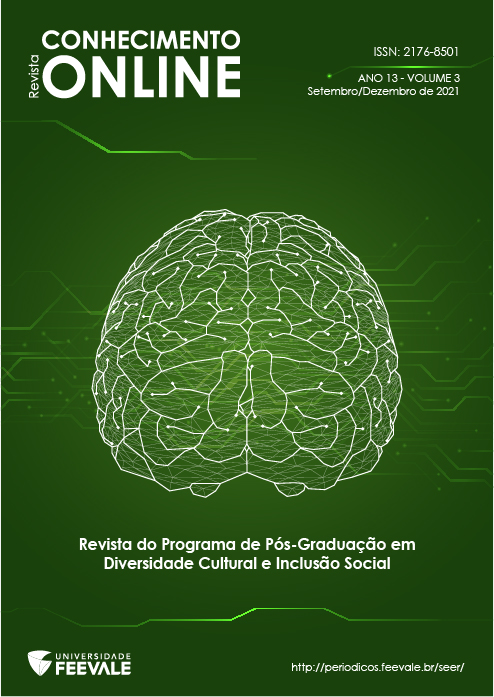LAS EXPERIENCIAS EMOCIONALES COMO FACTOR EN LA CONSTRUCCIÓN DE LA IDENTIDAD CURRICULAR DOCENTE
DOI:
https://doi.org/10.25112/rco.v3.2491Palavras-chave:
Identidad Curricular, Docente, Experiencias emocionales, Profesorado, CurrículumResumo
Este artículo analiza las experiencias emocionales dentro de la construcción de una Identidad Curricular Docente, de la cual existen pocos estudios, debido al componente de una posible identificación con el currículum; se trata de un estudio que tiene como objetivos comprender cómo construye, a partir de experiencias emocionales, una Identidad Curricular Docente, el profesorado novel y el profesorado en formación inicial de pedagogía; asimismo precisa conocer con qué tipo de currículum se identifica el docente novel y el profesorado en formación inicial de pedagogía; y finalmente se pretende contribuir a investigaciones sobre Identidad Docente a través de un aspecto curricular. El estudio utiliza un diseño biográfico-narrativo, utilizando la entrevista semiestructurada como instrumento de recopilación de información. Los datos obtenidos señalan la importancia de considerar el aspecto emocional dentro de la identificación del profesorado con algún currículum en específico, junto a las metodologías que este adscribe, comprendiendo así, que las experiencias emocionales construyen en gran parte, la Identidad Curricular Docente.
Referências
ABEDNIA, A. Teachers’ professional identity: Contributions of a critical EFL teacher education course in Iran. Teaching and Teacher Education, p. 706–717. 2012.
ANSPAL, T.; LEIJEN, Ä.; LÖFSTRÖM, E. Tensions and the teacher’s role in student teacher identity development in primary and subject teacher curricula. Scandinavian Journal of Education, p. 1–17. 2018.
BEAUCHAMP, C.; THOMAS, L. Imagination and reflection in teacher education: The development of professional identity from student teaching to beginning practice. The First Annual Research Symposium on Imaginative Education. Vancouver, 2006.
CANTÓN, I.; TARDIF, M. Identidad profesional docente. Madrid: Narcea, 2018.
CATTONAR, B. Les identités professionnelles enseignantes. Ebauche d’un cadre d’analyse, p. 10. 2001.
CATTONAR, B. Homogénéité et diversité des identités professionnelles enseignantes. En: CHRISTIAN MAROY (Ed.). L’enseignement secondaire et ses enseignants. Bruxelles, 2002.
CRESWELL, J. Qualitative inquiry and research design. Choosing among five traditions. Londres: Sage Publications, 1998.
CHONG, S.; LOW, E.; GOH, K. Emerging Professional Teacher Identity of Pre-Service Teachers. Australian Journal of Teacher Education, p. 50–64. 2011.
DAY, C. Pasión por enseñar. La identidad personal y profesional del docente y sus valores. Madrid, 2011.
ESCOBAR, J.; CUERVO-MARTÍNEZ, A. Validez de contenido y juicio de expertos: una aproximación a su utilización. Avances en Medición, p. 27-36. 2008.
FENSTER, T. Gender and the City: The Different Formations of Belonging. En: L. N. SEAGER. A Companion to Feminist Geography Routledge. USA: Blacwell Publishing Ltd, 2005.
FLORES, M. A.; C. DAY. Contexts Which Shape and Reshape New Teachers Identities: A Multi-Perspective Study. Teaching and Teacher Education, p. 219-232. 2006.
GARCÍA, J. La educación emocional, su importancia en el proceso de aprendizaje. Revista educación, p. 1-24. 2012.
GOHIER, C.; ANADÓN, M.; BOUCHARD, Y.; CHARBONNEAU, B.; CHEVRIER, J. La construction identitaire de l’enseignant sur le plan professionnel: un processus dynamique et interactif. Revue des sciences de l’éducation, p. 3-32. 2001.
HERNÁNDEZ, R.; FERNÁNDEZ, C.; BAPTISTA, P. Metodología de la investigación, Quinta edición. México: McGraw-Hill/Interamericana Editores, S.A., 2010.
KAGAN, D. M. Professional Growth among Preservice and Beginning Teachers. Review of Educational Research, p. 129–169. 1992.
LANDÍN, M.; SÁNCHEZ, S. El método biográfico-narrativo. Una herramienta para la investigación educativa. México: Universidad Veracruzana, 2019.
LASKY, S. A Sociocultural Approach to Understanding Teacher Identity, Agency, and Professional Vulnerability in a Context of Secondary School Reform. Teaching and Teacher Education, p. 899-916. 2005.
MADUEÑO, M.; MARQUEZ, L. Formación de la identidad docente de estudiantes de la carrera de Educación Primaria desde la experiencia de la práctica profesional. México: Instituto Tecnológico de Sonora, Departamento de Educación, 2020.
MIRANDA, G.; VARGAS, M. Identidad profesional y formación docente universitaria: Un proceso en construcción desde la mirada del estudiantado. Revista Actualidades Investigativas en Educación, 2019.
MELÉNDEZ, R.; CARABALLO, C.; PÁEZ, M.; COELLO, E. El currículum y la competencia profesional en la formación de profesores de matemáticas. Currículum y competencia profesional. Didáctica y Educación, p. 129-150. 2017.
PILLEN, M.; BEIJAARD, D.; BROK, P. Tensions in beginning teachers’ professional identity development, accompanying feelings and coping strategies. European Journal of Teacher Education, p. 240-260. 2013.
PRABJANDEE, D. Teacher professional development to implement Global Englishes language teaching. Asian Englishes, p. 52-67. 2020.
REIO, T. G. Emotions as a lens to explore teacher identity and change: A commentary. Teaching and Teacher Education, p. 985-993. 2005.
RIVAS, M. La experiencia escolar como dimensión generadora de interés por la profesión docente. Revista Reflexión e Investigación Educacional. Chile: Universidad del Bío-Bío, 2020.
RODRÍGUEZ, C. Identidad profesional docente. Revista de Currículum y Formación del Profesorado, p. 529-532. 2018.
SALAZAR, L. Actitud de estudiantes, de segundo año de pedagogía media en inglés de una Universidad de la Octava Región, hacia la revisión colaborativa de errores gramaticales. Chile: Universidad Católica de la Santísima Concepción, 2018.
SALGADO, A. Investigación Cualitativa: Diseños, Evaluación del Rigor Metodológico y Retos. Perú: Universidad de San Martín de Porres, 2007.
SHAPIRO, S. Revisiting the teachers’ lounge: Reflections on emotional experience and teacher identity. Teaching and Teacher Education, p. 616-621. 2010.
SLOAN, K. Teacher Identity and Agency in School Worlds: Beyond the all-good/allbad Discourse on Accountability-explicit Curriculum Policies. Curriculum Inquiry, p. 119-152. 2006.
TAYLOR, S.; BOGDAN, R. Introducción a los métodos cualitativos de investigación. Barcelona: Paidós, 1989.
ZEMBYLAS, M. Interrogating “teacher identity”: emotion, resistance, and self-formation. Educational Theory, p. 107-127. 2003.
ZEMBYLAS, M. Discursive practices, genealogies, and emotional rules: a poststructuralist view on emotion and identity in teaching. Teaching and Teacher Education, p. 935-948. 2005.
Downloads
Publicado
Como Citar
Edição
Seção
Licença
Copyright (c) 2021 Revista Conhecimento Online

Este trabalho está licenciado sob uma licença Creative Commons Attribution 4.0 International License.
• Os autores mantêm os direitos autorais e concedem à revista o direito de primeira publicação com o trabalho licenciado sob a Licença Creative Commons - Attribution 4.0 International (CC BY 4.0).
• Os autores são estimulados a publicar e distribuir seu trabalho online (ex.: em repositórios institucionais ou na sua página pessoal), pois isso pode aumentar o impacto e a citação do trabalho publicado.


